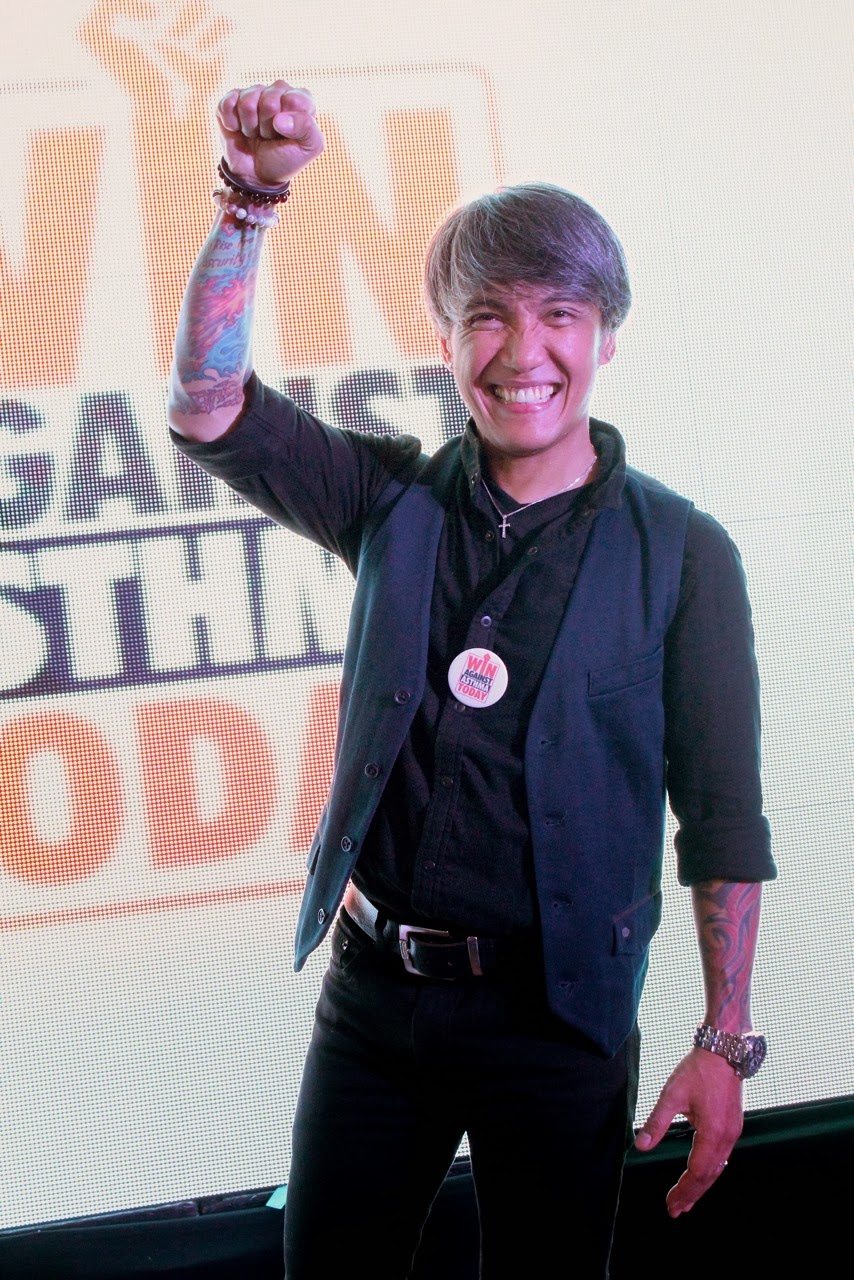Last February 6, 2014 at Makati Shangrila for GSK's Win Against Asthma Today campaign .
Department of Health (DOH) Assistant Secretary Dr. Eric Tayag graced the event and used the dance floor to support the campaign. In his message, he said that the department has included asthma as one of the lifestyle diseases that need people's awareness. "GSK is known to produce treatment for asthma.
This is a good partnership to create awareness and we're glad that Kim Chiu and Arnel Pineda support the campaign. There is cure for asthma and can be controlled,"
Asthma is chronic inflammatory disorder of the airways in which many cells play a role. This
inflammation causes symptoms which are usually associated with widespread but variable
airflow obstruction that is often reversible either spontaneously or with treatment, and causes
an associated increase in airway responsiveness, i.e constriction of the airways, to a variety
of stimuli. The symptoms of asthma are wheezing, breathlessness, chest tightness and
coughing particularly at night or in the early morning.
Asthma affects 235 million people worldwide1 and 10.7 million people in the Philippines2. It is
estimated that another 100 million people will suffer from asthma by 2025.3
There are an estimated 250,000 annual worldwide deaths from asthma.3 Most of these
deaths occur in those over 45 years old and are largely preventable.4
Asthma is the most common chronic disease of childhood and is the leading cause of
childhood morbidity from chronic disease as measured by school absences, emergency
visits and hospitalizations.
The cost incurred by asthma, particularly uncontrolled asthma, is substantial. Asthma was
PhilHealth’s 13th most reimbursed condition in 2011 with 61,219 claims and for which
Philhealth paid Php369 million . This increased to 92,981 and became the 6th most
reimbursed condition in 2012 and for which Philhealth spent Php836.829 million.5
Despite the availability of treatment guidelines and medicines for the treatment and
management of asthma, the majority of patients with asthma remain to be uncontrolled thus
leading to compromised lives. According to the AIRAP 26 study, only 1% of children with
asthma in the Philippines are well-controlled.
90% of asthma patients expect to have symptoms as part of their condition.7 53% of asthma
patients regularly use rescue medication at least once per day to cope with their symptoms.8
In the Asia Pacific, which includes the Philippines, activity limitation caused by asthma was
considerable. A mean of 44.7% of respondents reported that normal physical activity was
compromised, and 37.9% believed that their choice of job or career was limited. A total of
52.7% of respondents said that sports and recreation were affected, and 37.6% believed
their lifestyle was restricted. Almost 50% reported sleep disturbances.2
A lot of asthma patients do not realise that they are settling by accepting as normal the
lifestyle restrictions resulting from uncontrolled asthma. Patients unnecessarily accept
symptoms, assuming that frequent symptoms, exacerbations and lifestyle limitations are an
inevitable consequence of having asthma. They may feel that although current treatments
can alleviate their asthma symptoms, they just need to accept and bear that it normally
happens. This is where the partnership and constant consult with their doctors become very
important.
Asthma can be a serious condition but it can be controlled. Access to doctors and treatment
has been shown to significantly decrease asthma deaths and hospitalizations.9 People with
asthma can lead normal and active lives. They can even excel.
By launching the Win Against Asthma campaign, GSK is taking a very big opportunity to
increase awareness and amplify existing efforts to spread information about asthma and how
it can be managed. GSK strongly believes and advocates that in partnership with their
doctors, asthma patients can realize that their condition need not deter them from achieving
their goals.
GSK’s Win Against Asthma campaign, launched this 2104, is an integrated advocacy
campaign that leverages different communication platforms (eg. TV, radio, print, digital and
community activations) to ensure wider audience reach. The Win Against Asthma campaign
will provide useful information to asthma sufferers, their families and support groups about
the disease and how it can be managed. To highlight that asthma need not deter one from
reaching his/her goals, real asthma patients will provide testimony of their experiences and
how they have won against asthma. Win Against Asthma calls Filipinos to action to consult
their doctors and discuss the best way to manage their asthma.
The objective of this Press Conference is to amplify the reach of the Win Against Asthma
campaign amongst patients, the public and the medical community.
Resources:
1. The global asthma report 2011
2. Eur Respir Rev 2006;15:10–16
3. Global Initiative for Asthma. GINA Report Global Strategy for Asthma
Management and Prevention. December 2011
4. Braman SS. Chest 2006; 130: 4S–12S
5. PhilHealth 2012 Stats and Charts
6. Allergy 2013; 68: 524–530
7. Bellamy D et al. Prim Care Resp J 2005; 14:252-258
8. Demoly et al. Eur Resp Rev 2010; 19: 150-15
9. Thorax 2006;61:663–670




